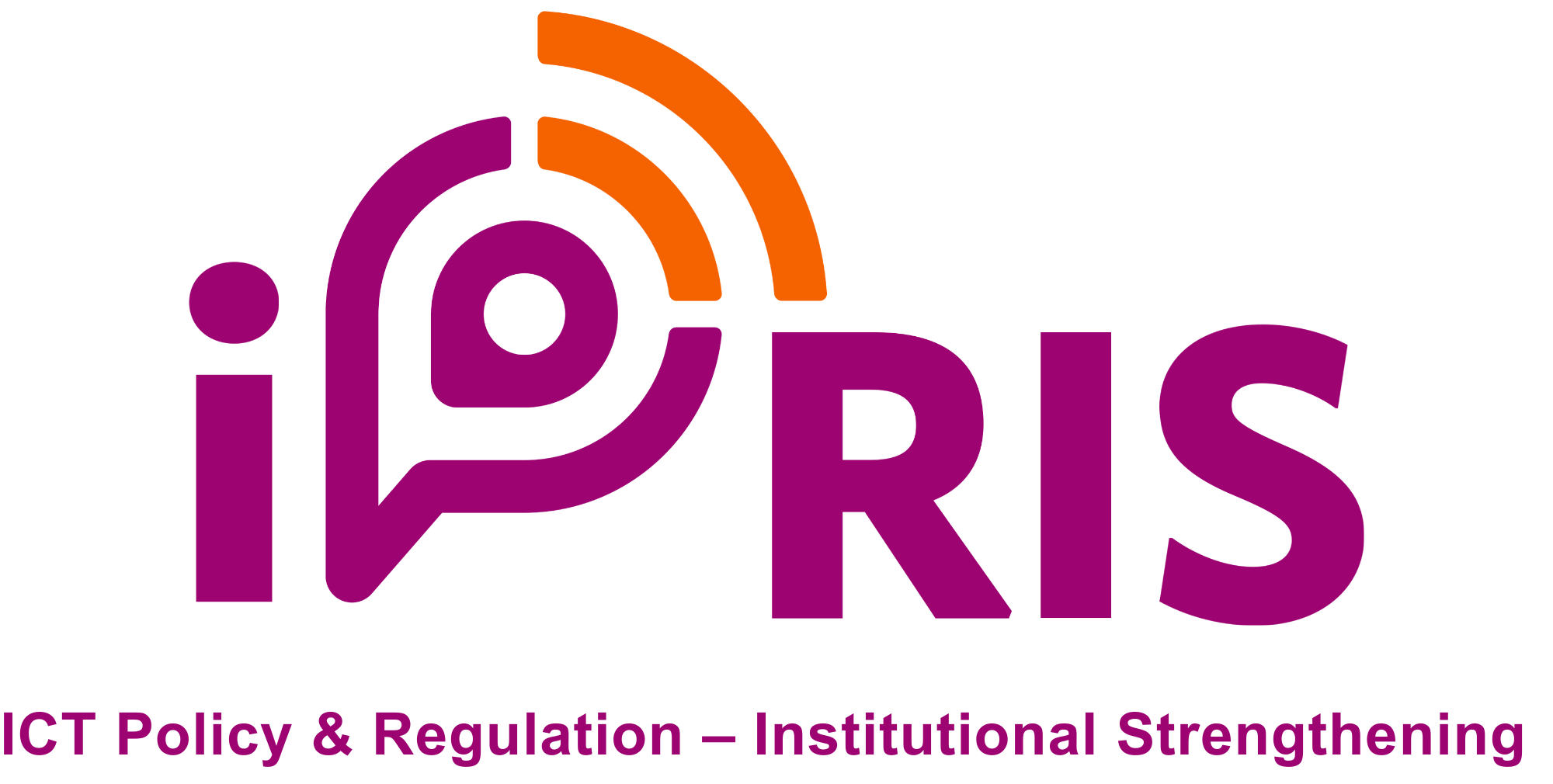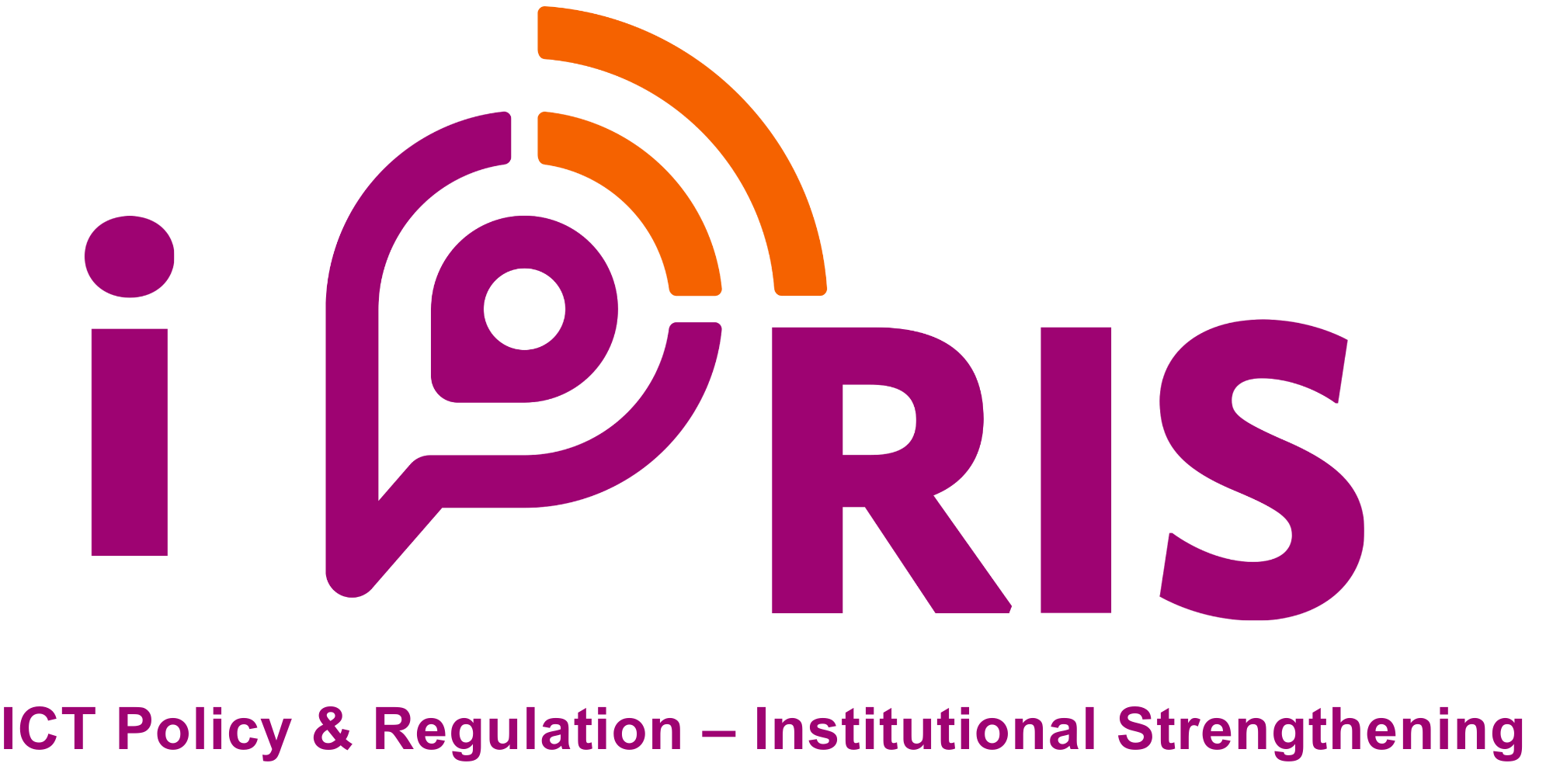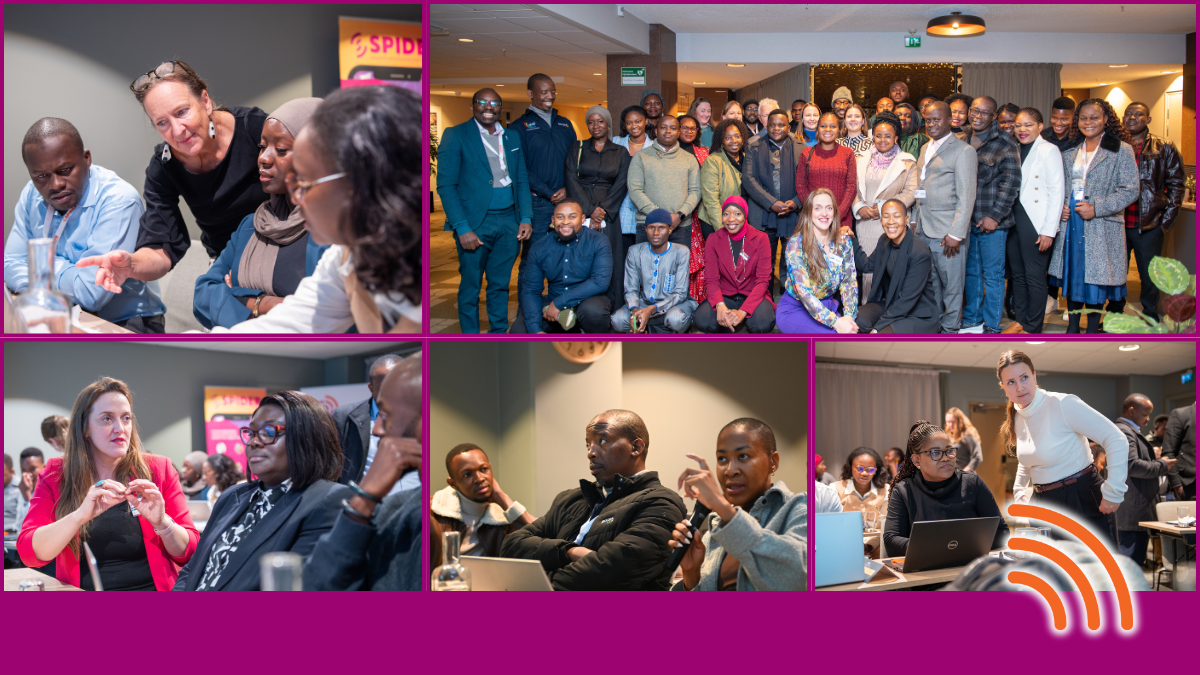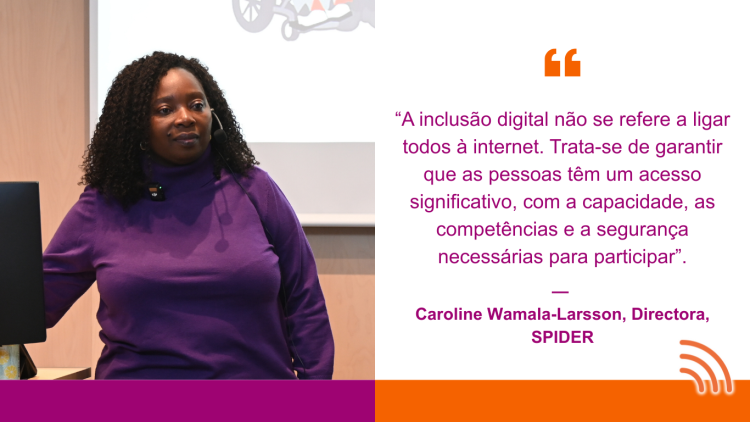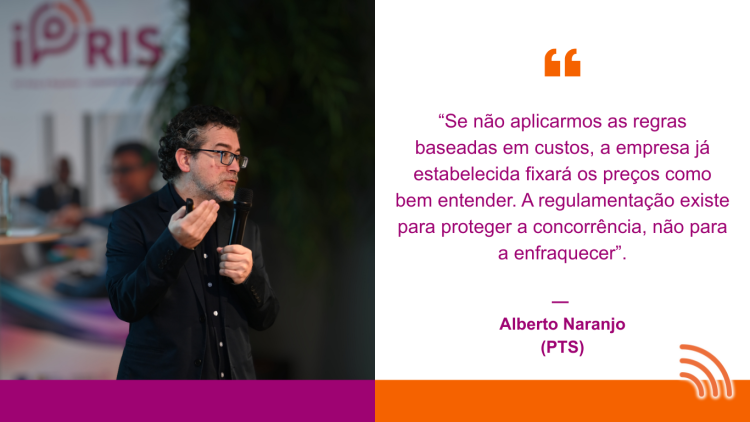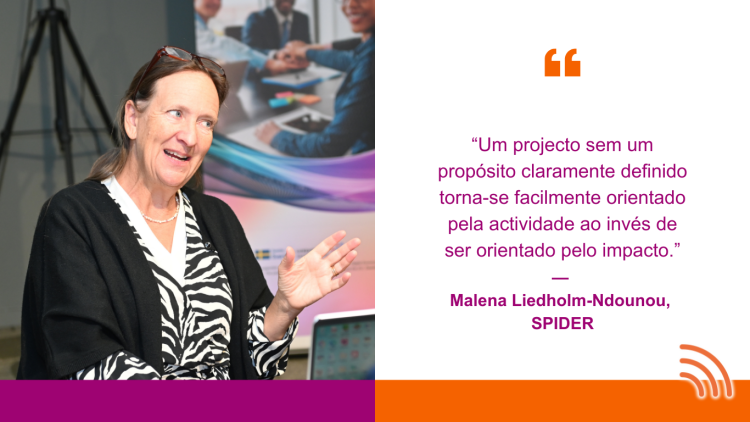O Projecto iPRIS completa dois anos em Novembro! A sétima turma do iPRIS completará um marco significativo no programa de formação entre pares dirigido aos Reguladores de Telecomunicações em 43 países.
Esta turma reunirá em Estocolmo, na Suécia, de 16 de Novembro a 3 de Dezembro de 2025, para a primeira fase do Projecto. Os participantes incluirão Reguladores de Telecomunicações do Botswana, Gana, Quénia, Lesoto, Malawi, e Gâmbia. Serão também acompanhados por outros especialistas africanos em TIC de Organizações Reguladoras Regionais (ORR): a Organização de Comunicações da África Oriental (EACO), a Associação de Reguladores de Comunicações da África Austral (CRASA) e a Assembleia de Reguladores de Telecomunicações da África Ocidental (WATRA), que compartilharão lições aprendidas com as estruturas de cooperação regional. Todos estes participantes irão colaborar e envolver-se em discussões significativas ao longo das três semanas para melhorar a capacidade institucional, a cooperação regulamentar e o desenvolvimento digital inclusivo.
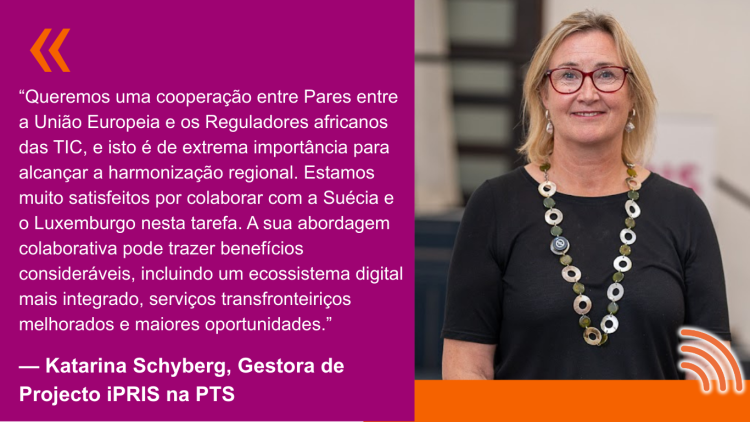
Dois anos de colaboração e crescimento
Desde a sua criação, em Novembro de 2023, o programa iPRIS evoluiu para uma plataforma dinâmica de Aprendizagem Entre Pares e Cooperação Regional. Até à data, apoiou mais de 120 reguladores de Telecomunicações em 31 países africanos, promovendo abordagens inclusivas e baseadas em evidências para as políticas e regulamentação das TIC.
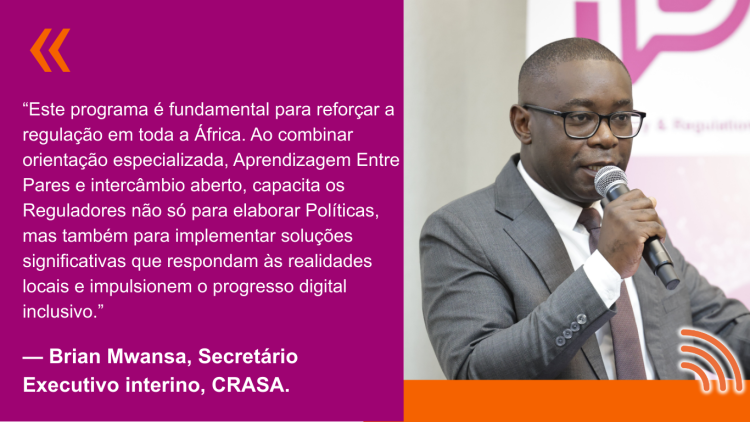
Até ao momento, o iPRIS envolveu 31 ARN em toda a África Subsariana, incluindo:
Benim, Burundi, Camarões, República Centro-Africana, Chade, Comores, Congo-Brazzaville, República Democrática do Congo, Eswatini, Gabão, Gâmbia, Gana, Quénia, Lesoto, Libéria, Malawi, Mauritânia, Maurícias, Namíbia, Nigéria, Ruanda, Senegal, Serra Leoa, África do Sul, Sudão do Sul, Tanzânia, Togo, Uganda, Zâmbia, Zimbabué e Guiné Equatorial.
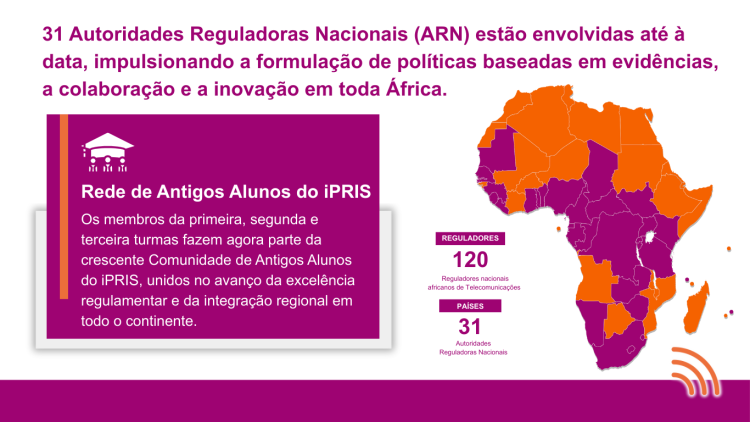
Os países que se juntam à sétima turma elevarão este número para 32 países, reflectindo a expansão do Programa e a sua crescente comunidade de Reguladores empenhados em fortalecer o futuro digital de África. Através do seu modelo colaborativo, o iPRIS envolveu mais de 200 especialistas em Telecomunicações de África e da Europa, promovendo o intercâmbio contínuo entre as Autoridades Reguladoras Nacionais (ARN), as Organizações Reguladoras Regionais (ORR) e os Parceiros europeus. Esta rede crescente continua a reforçar a liderança institucional, a melhorar a coerência das políticas e a superar as divisões regionais na governação digital. Cada turma contribui para um ecossistema de conhecimento mais amplo, onde os Reguladores africanos partilham as melhores práticas, implementam reformas piloto e constroem parcerias sustentáveis que, colectivamente, aceleram a transformação digital do continente.
A seguir, um resumo de alguns dos especialistas e reguladores em Telecomunicações que fizeram parte desta viagem até agora.

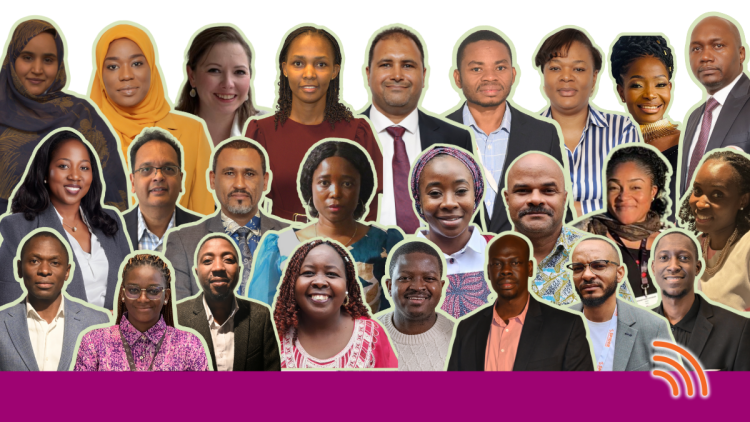
Progresso na região

O impacto já é visível. Na Tanzânia, os Reguladores foram pioneiros nas Directrizes de Ligação Directa via Satélite para Dispositivos Móveis (DTM), alargando a conectividade a áreas remotas. Em Moçambique, uma Iniciativa de Mudança transformou-se num Regulamento Nacional de Roaming que permite que as famílias rurais se mantenham ligadas mesmo quando uma rede falha. Nas Maurícias, os Reguladores estão a proteger o ecossistema digital com novas Diretrizes de Cibersegurança, reforçando a confiança nas plataformas online, e preparando-se para um futuro impulsionado pelo 5G. O Uganda ganhou destaque no panorama global ao acolher o Simpósio Global da UIT para Reguladores (GSR 2024), trazendo 900 delegados a Kampala e demonstrando a liderança da África Subsariana na governação digital.
Estes marcos são o resultado de esforços colaborativos entre Governos, Entidades reguladoras, Parceiros de desenvolvimento e Entidades regionais. O iPRIS orgulha-se de ter contribuído como parte desta comunidade mais ampla, impulsionando a transformação digital.
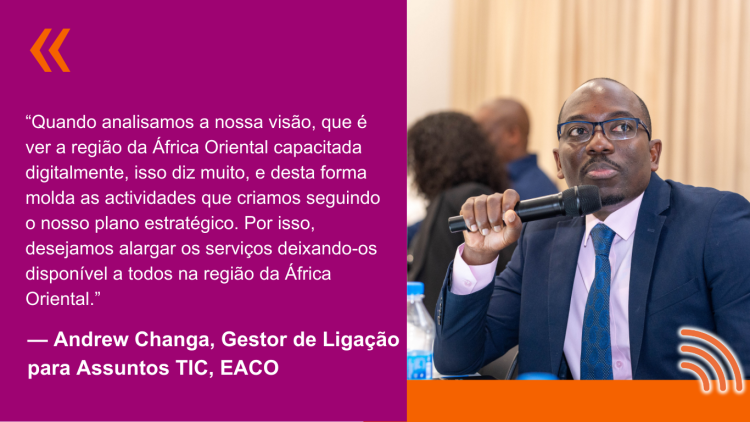
Implementação do Regulamento regional da CEDEAO sobre o roaming livre
Na WATRA estão em curso diversas iniciativas, a maioria das quais já apresentou resultados que contribuem para proporcionar uma conectividade significativa na sub-região. Algumas destas iniciativas incluem:
- Apoio à implementação do Regulamento Regional de Livre Roaming da CEDEAO, que até à data proporcionou uma comunicação acessível durante a migração dentro e entre 9 países da África Ocidental, com mais progressos a serem alcançados com o apoio esperado do Grupo de Trabalho 2 do programa iPRIS.
- O advento das operações em Órbita Não-Geoestacionária (NGSO) levou ao desenvolvimento de uma Estrutura NGSO a nível regional (WATRA), que fornece um guia para os Reguladores sobre como envolver com sucesso os operadores NGSO e aproveitar os seus serviços para promover uma maior cobertura e conectividade, especialmente nas áreas carenciadas e não servidas da região.
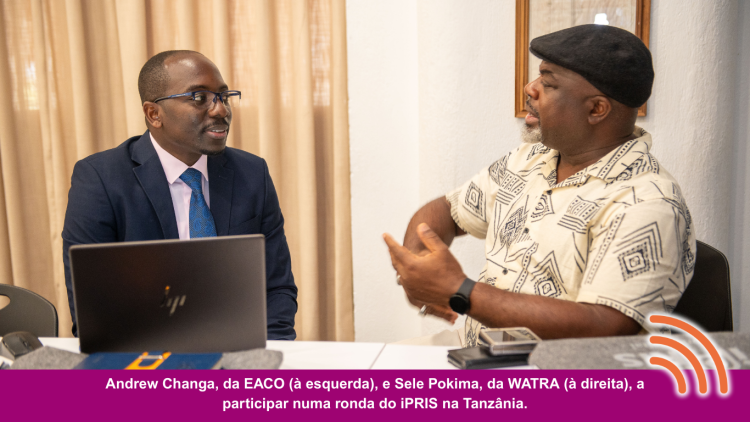
A WATRA orgulha-se também de desempenhar um papel activo na concretização da Estratégia de Transformação Digital (ETD) 2020-2030 para África, garantindo uma conectividade significativa a todos os níveis do continente, do primeiro ao último quilómetro. Através do projecto iPRIS, foram desenvolvidas diversas iniciativas para promover a conectividade em toda a sub-região, abordando áreas críticas do sector das Telecomunicações, incluindo a gestão do espectro e a implementação do 5G. Com outras colaborações importantes com a UIT, a Smart Africa e outros parceiros de desenvolvimento, a WATRA está a avançar para garantir uma conectividade significativa em toda a África Ocidental e em África no geral.
O acesso ao 5G já chega a metade do planeta, mas milhões continuam desligados
De acordo com o Relatório sobre os Objectivos de Desenvolvimento Sustentável de 2025, que marca o décimo balanço anual de progresso global rumo à Agenda 2030, o mundo encontra-se numa encruzilhada crítica. Com apenas cinco anos para alcançar os ODS, o Relatório apresenta uma avaliação contundente: embora milhões de vidas tenham melhorado, o ritmo da mudança continua a ser insuficiente para atingir todos os 17 Objectivos até 2030. O Relatório sublinha que os Objectivos continuam ao alcance apenas se a acção for acelerada agora. Em todo o mundo, os jovens, as comunidades, a sociedade civil e os líderes locais estão a impulsionar os esforços para cumprir a promessa dos ODS. A conectividade é uma parte fundamental deste esforço global. Embora a cobertura do 5G se tenha expandido para atingir 51% da população mundial até 2024, apenas cinco anos após a sua estreia comercial, o progresso continua profundamente desigual. Oitenta e quatro por cento das pessoas nos países de rendimento elevado têm acesso ao 5G, em comparação com apenas 4% nos países de rendimento baixo.

Onde o 5G não está disponível, o 4G continua a ser uma alternativa vital, cobrindo 92% da população mundial. No entanto, nos países de baixo rendimento, o 4G apenas atinge os 52%, deixando o 3G como o principal meio de acesso à internet para muitos. No entanto, é alarmante que 4% da população mundial continua totalmente sem cobertura de banda larga móvel, com as maiores lacunas na Oceânia (excluindo a Austrália e a Nova Zelândia), onde 24% não têm qualquer acesso. Os Países Menos Desenvolvidos (PMD) e os Países em Desenvolvimento Sem Litoral (PDSL) enfrentam desafios semelhantes, 15% e 14% das suas populações, respectivamente, não têm acesso à banda larga móvel. Estas disparidades realçam a necessidade urgente de uma transformação digital inclusiva e de investimentos direcionados para garantir que ninguém, ou qualquer comunidade, é deixado para trás na era digital.
Destaques: Uma viagem de Aprendizagem Entre Pares com a duração de três semanas
Esta fase seguinte oferece aos participantes uma combinação abrangente de sessões conduzidas por especialistas, trabalho colaborativo em projectos e visitas de campo que ligam a teoria à prática. As discussões irão girar em torno dos seguintes componentes:
- Sessões conjuntas da Oferta Europeia conduzidas por especialistas da PTS e profissionais de Telecomunicações de outros Parceiros sobre temas como a implementação da banda larga, atribuição de espectro, comunicações seguras, enquadramento institucional e legal, questões regulamentares futuras, controlo da concorrência e numeração e endereçamento. As discussões sobre inclusão digital estão entre as outras sessões relevantes realizadas.
- Discussões sobre a gestão de projectos, para além do Acesso Universal e do MEAL (Monitorização, Avaliação, Responsabilização e Aprendizagem) conduzidas pelo SPIDER para melhorar a implementação das Iniciativas de Mudança a nível nacional.
- Visitas à sede da PTS, à Universidade de Estocolmo, à Ericsson e à Telia, onde os participantes irão conhecer modelos de inovação e governação que são pró-consumidor e, ao mesmo tempo, possibilitam o crescimento.
- Foi planeado um jantar de confraternização no Museu Vasa para facilitar a cooperação e o intercâmbio cultural.
Ao longo do período, cada Autoridade Reguladora Nacional (ARN) continuará a melhorar a sua Iniciativa de Mudança, um plano nacional de reforma que visa reforçar o desempenho institucional e tornar o ambiente regulamentar sustentável e inclusivo.
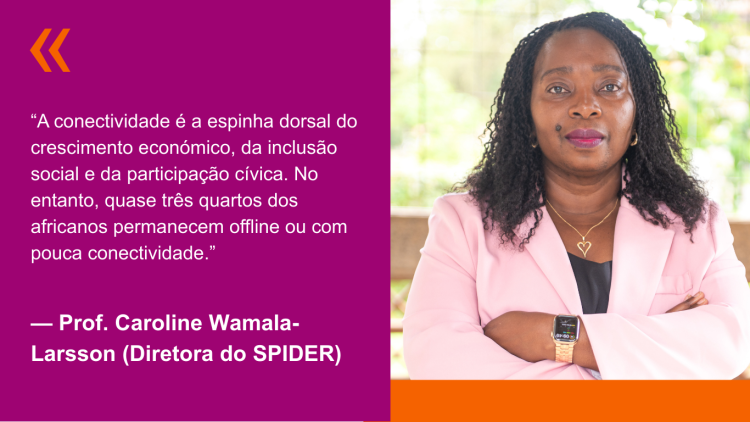
Ampliar o impacto para além da troca de conhecimento
Ao completar dois anos, o iPRIS demonstra, através da sua crescente rede de antigos participantes e grupos activos, o compromisso contínuo do Programa em reforçar a regulamentação das TIC em toda África. Até à data, três grupos concluíram o ciclo do iPRIS, integrando a rede de antigos participantes, representando regiões anglófonas e francófonas. O sétimo grupo, que se reunirá em breve em Estocolmo, dá continuidade a este legado de colaboração e aprendizagem entre pares. Dois grupos francófonos participaram no projecto iPRIS, e espera-se que outros se juntem nos próximos anos. Claudio Bacigalupi, Chefe de Cooperação da Delegação da União Europeia na Zâmbia e no COMESA, destacou a importância da colaboração para alcançar a harmonização regional e criar um ambiente mais propício à inovação, ao investimento e aos serviços digitais transfronteiriços.
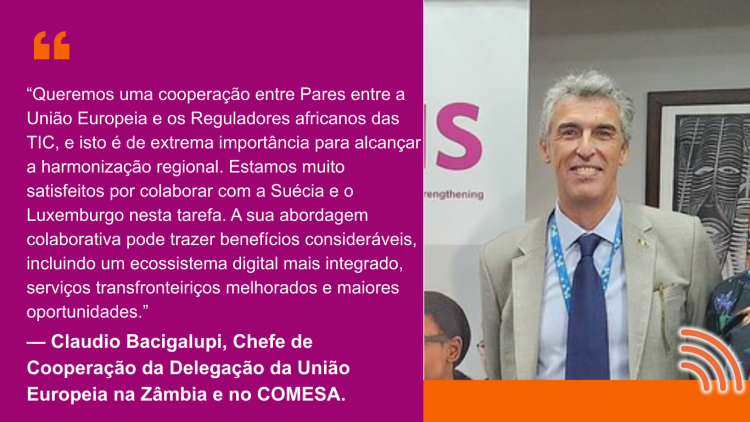
Em 2026, o iPRIS irá expandir ainda mais o seu alcance através de períodos de rondas dedicadas à língua portuguesa, concebidas para reforçar a inclusão regional e a diversidade linguística no diálogo sobre políticas digitais. Até ao final do projecto, em 2028, prevê-se que o iPRIS tenha formado mais de 300 Reguladores de Telecomunicações africanos de 43 Autoridades Reguladoras Nacionais (ARN) no desenvolvimento e implementação de reformas baseadas em evidências para o desenvolvimento digital sustentável.
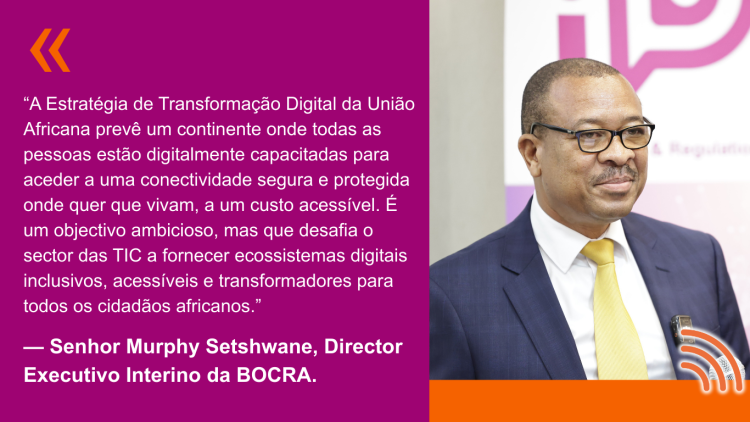
Com a conclusão do encontro desta nova turma no início de Dezembro, os participantes apresentarão os seus planos de projecto denominados "Caminho a Seguir", roteiros estratégicos para a implementação de reformas regulamentares nos respectivos países, com o apoio dos seus Gabinetes Regionais de Reforma (RROs). Esta colaboração entre especialistas africanos e europeus em Telecomunicações continua a demonstrar como a aprendizagem partilhada e a parceria podem fortalecer a capacidade institucional, promover a inclusão digital e acelerar a transformação de África rumo a um futuro ligado e sustentável.
Acompanhe a viagem da sétima turma do iPRIS e as suas Iniciativas de Mudança na página do iPRIS no LinkedIn, enquanto traduzem insights globais em impacto nacional no panorama digital de África.
O iPRIS é coordenado e implementado pelo SPIDER, numa parceria estratégica e técnica com a Autoridade Sueca de Correios e Telecomunicações (PTS) e o Instituto Regulador do Luxemburgo (ILR).
O iPRIS é financiado pela União Europeia, Suécia e Luxemburgo no âmbito da iniciativa Equipa Europa “D4D para a Economia e Sociedade Digitais na África Subsariana” (Código: 001).
